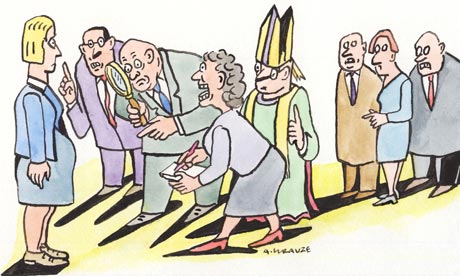
Guilt hangs over this column like a cloud. I am cutting gags about the Alien movies, even though they best describe my feelings. I dreamed that a baby burst out of my abdomen last night, an image utterly remote from most luscious baby marketing. I know I should be grateful, because I am going to have a child at 39, a fate I thought would elude me, because I read the Daily Mail, where I am informed my fertility halves every day after the age of 30, or similar; as Bette Davis sang, they're either too young or too old. I feel readers are poised to judge and say – if I am not willing to be mono-grateful, why spawn at all? I am grateful that my body will split in half in late summer, and I will probably live through it, being a resident of the affluent west, but the gratitude is ambivalent. And, as the child grows, I meet other pregnant women and learn that we are not all living in a Barbie Gets Up the Duff Dream Palace of Fecund Ecstasy; some of us are depressed, resentful, afraid. But we are, on the whole, silent, in the shadow of the tyranny of impending motherhood.
And why not? Women are skilled at segueing into stereotypes that are soothing for other people, and maddening for themselves – the blissful wife, the ever-aroused lover, the good mother. Who wants a complaining, or bitter, or terrified, or partial mother? Search the tabloids for details of mothers who fail, and hurt or abandon their children; fathers who fail are no less culpable, but more numerous and indulged. Last week Kate Winslet announced she was pregnant with her third child by her third husband. This is considered bad motherhood by bad journalists. The spiteful phrase 3X3 was used.
This nonsense is ancient and tenacious. Its poster girl is Mary, mother of God, and she was a woman so entirely possessed by motherhood, she didn't even have sex to achieve it. She was impregnated by the holy spirit (1X1, I think) or, if you are not a Christian, by the holy patriarchy, and she is serene, lovely and hopelessly over-sold. She is the virgin heroine we are judged by as we moan and swell like lowing beasts; of actual, screaming childbirth she tells us nothing. She is motherhood shorn of lust and blood. She is spin.
There is a weird universality to impending motherhood, a sense of shared ownership, and of living inside a fertility ritual that quickly ceases to be anything to do with you. You are a second-grade version of Roman Polanski's Rosemary; a vessel, approved of but ignored, possessed, in fact, by a possible future. Strangers grab you, and hug you, and even touch your belly; they are almost always women. One man, a Daily Mail executive, asked me if I was married, and only then congratulated me. I laughed at him; he was like a pastiche. Their happiness is irrational and interesting, because it is twin to the fury some express, so personally, towards abortion that they loiter outside family planning clinics with rosaries, believing that the aborting mother is depriving the world of something that comforts it, even if they will never know it; a prayer, in fact. (There are so many ways for women to feel owned.) This wall of idiocy is impregnable, and savage. Who can complain of physical fear, of the nightmare of a baby eating its way out of your abdomen, of the loss of professional autonomy, staring at a stranger's idiotic grin? Pregnancy has made me more pro-choice, not less; an unwanted pregnancy, I now know for certain, is too much to ask, here or anywhere.
I suspect it is manageable if you are happy. But what if you are not? At three months pregnant, I developed depression. I cried all day and I sincerely believed it would be better if the baby had another mother. I recovered, but I wished that people would stop congratulating me. I resented them for it, and myself for the resentment; the guilt spiralled. How many women with post-natal depression would recover quicker, if they felt less guilt, and could voice ambivalence?
The problem is, the fantasy has leaked into midwifery. Women's rational anxieties are brushed aside, while expectations of us are irrational. Last week we were warned about paint, new furniture, and even non-stick pans, as if a pregnant woman can detach herself entirely from reality, and live in an unpolluted tableaux that looks like Tolkien's Shire.
We are criticised for wanting pain relief, or caesarian sections, or even to bottle feed, because that makes it easier to sleep and conserve our jobs and future independence; medicine, it seems, is not for the expectant mother. A friend who went to National Childbirth Trust classes was told only to breathe and imagine a beach and all would be fine; in fact, she was denied pain relief and access to her partner, and gave birth in pain and fear. This is what happens when you idealise motherhood; the reality, when it comes in contractions, chokes you. This is the martyrdom of an entire sex and it is foolish and childlike, made by babes.
Twitter: @TanyaGold1

